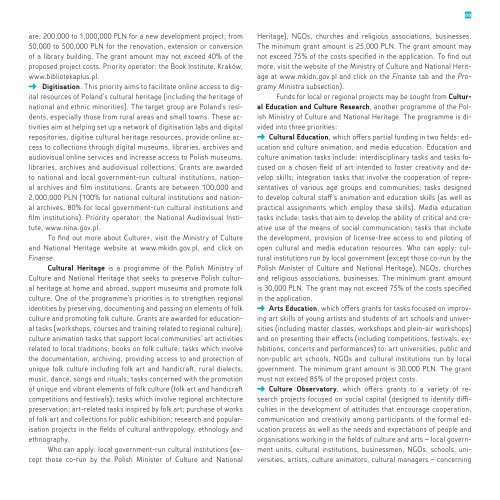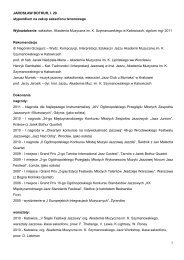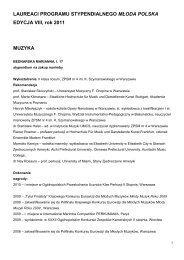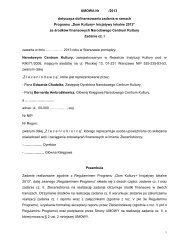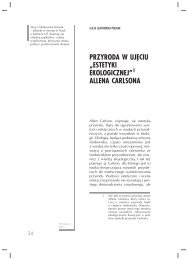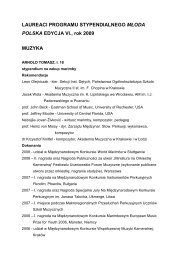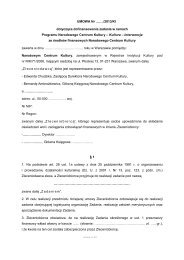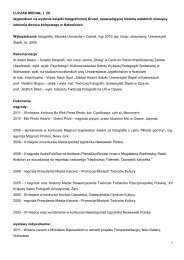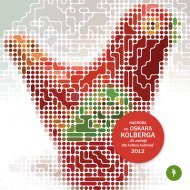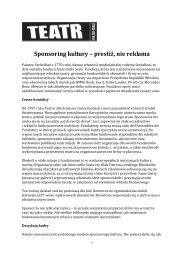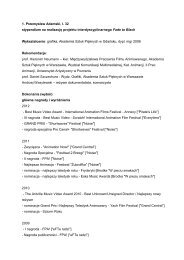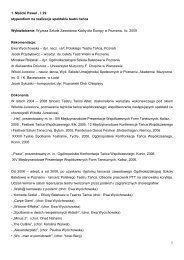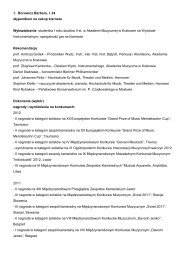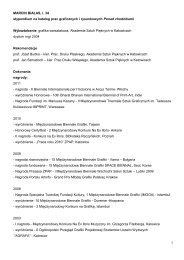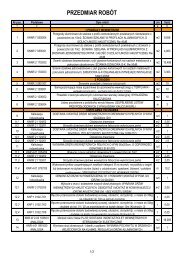Untitled - Narodowe Centrum Kultury
Untitled - Narodowe Centrum Kultury
Untitled - Narodowe Centrum Kultury
You also want an ePaper? Increase the reach of your titles
YUMPU automatically turns print PDFs into web optimized ePapers that Google loves.
tytuł artykułu 33<br />
are: 200,000 to 1,000,000 PLN for a new development project; from<br />
50,000 to 500,000 PLN for the renovation, extension or conversion<br />
of a library building. The grant amount may not exceed 40% of the<br />
proposed project costs. Priority operator: the Book Institute, Kraków,<br />
www.bibliotekaplus.pl.<br />
Digitisation. This priority aims to facilitate online access to digital<br />
resources of Poland’s cultural heritage (including the heritage of<br />
national and ethnic minorities). The target group are Poland’s residents,<br />
especially those from rural areas and small towns. These activities<br />
aim at helping set up a network of digitisation labs and digital<br />
repositories, digitise cultural heritage resources, provide online access<br />
to collections through digital museums, libraries, archives and<br />
audiovisual online services and increase access to Polish museums,<br />
libraries, archives and audiovisual collections. Grants are awarded<br />
to national and local government-run cultural institutions, national<br />
archives and film institutions. Grants are between 100,000 and<br />
2,000,000 PLN (100% for national cultural institutions and national<br />
archives, 80% for local government-run cultural institutions and<br />
film institutions). Priority operator: the National Audiovisual Institute,<br />
www.nina.gov.pl.<br />
To find out more about Culture+, visit the Ministry of Culture<br />
and National Heritage website at www.mkidn.gov.pl, and click on<br />
Finanse.<br />
Cultural Heritage is a programme of the Polish Ministry of<br />
Culture and National Heritage that seeks to preserve Polish cultural<br />
heritage at home and abroad, support museums and promote folk<br />
culture. One of the programme’s priorities is to strengthen regional<br />
identities by preserving, documenting and passing on elements of folk<br />
culture and promoting folk culture. Grants are awarded for educational<br />
tasks (workshops, courses and training related to regional culture);<br />
culture animation tasks that support local communities’ art activities<br />
related to local traditions; books on folk culture; tasks which involve<br />
the documentation, archiving, providing access to and protection of<br />
unique folk culture including folk art and handicraft, rural dialects,<br />
music, dance, songs and rituals; tasks concerned with the promotion<br />
of unique and vibrant elements of folk culture (folk art and handicraft<br />
competitions and festivals); tasks which involve regional architecture<br />
preservation; art-related tasks inspired by folk art; purchase of works<br />
of folk art and collections for public exhibition; research and popularisation<br />
projects in the fields of cultural anthropology, ethnology and<br />
ethnography.<br />
Who can apply: local government-run cultural institutions (except<br />
those co-run by the Polish Minister of Culture and National<br />
Heritage), NGOs, churches and religious associations, businesses.<br />
The minimum grant amount is 25,000 PLN. The grant amount may<br />
not exceed 75% of the costs specified in the application. To find out<br />
more, visit the website of the Ministry of Culture and National Heritage<br />
at www.mkidn.gov.pl and click on the Finanse tab and the Programy<br />
Ministra subsection).<br />
Funds for local or regional projects may be sought from Cultural<br />
Education and Culture Research, another programme of the Polish<br />
Ministry of Culture and National Heritage. The programme is divided<br />
into three priorities:<br />
Cultural Education, which offers partial funding in two fields: education<br />
and culture animation, and media education. Education and<br />
culture animation tasks include: interdisciplinary tasks and tasks focused<br />
on a chosen field of art intended to foster creativity and develop<br />
skills; integration tasks that involve the cooperation of representatives<br />
of various age groups and communities; tasks designed<br />
to develop cultural staff’s animation and education skills (as well as<br />
practical assignments which employ these skills). Media education<br />
tasks include: tasks that aim to develop the ability of critical and creative<br />
use of the means of social communication; tasks that include<br />
the development, provision of license-free access to and piloting of<br />
open cultural and media education resources. Who can apply: cultural<br />
institutions run by local government (except those co-run by the<br />
Polish Minister of Culture and National Heritage), NGOs, churches<br />
and religious associations, businesses. The minimum grant amount<br />
is 30,000 PLN. The grant may not exceed 75% of the costs specified<br />
in the application.<br />
Arts Education, which offers grants for tasks focused on improving<br />
art skills of young artists and students of art schools and universities<br />
(including master classes, workshops and plein-air workshops)<br />
and on presenting their effects (including competitions, festivals, exhibitions,<br />
concerts and performances) to: art universities, public and<br />
non-public art schools, NGOs and cultural institutions run by local<br />
government. The minimum grant amount is 30,000 PLN. The grant<br />
must not exceed 85% of the proposed project costs.<br />
Culture Observatory, which offers grants to a variety of research<br />
projects focused on social capital (designed to identify difficulties<br />
in the development of attitudes that encourage cooperation,<br />
communication and creativity among participants of the formal education<br />
process as well as the needs and expectations of people and<br />
organisations working in the fields of culture and arts – local government<br />
units, cultural institutions, businessmen, NGOs, schools, universities,<br />
artists, culture animators, cultural managers – concerning


